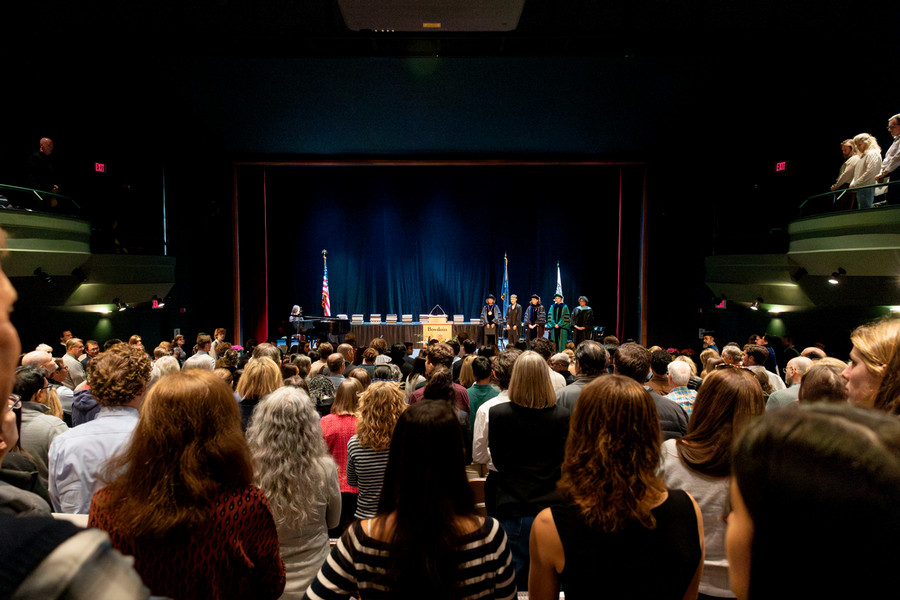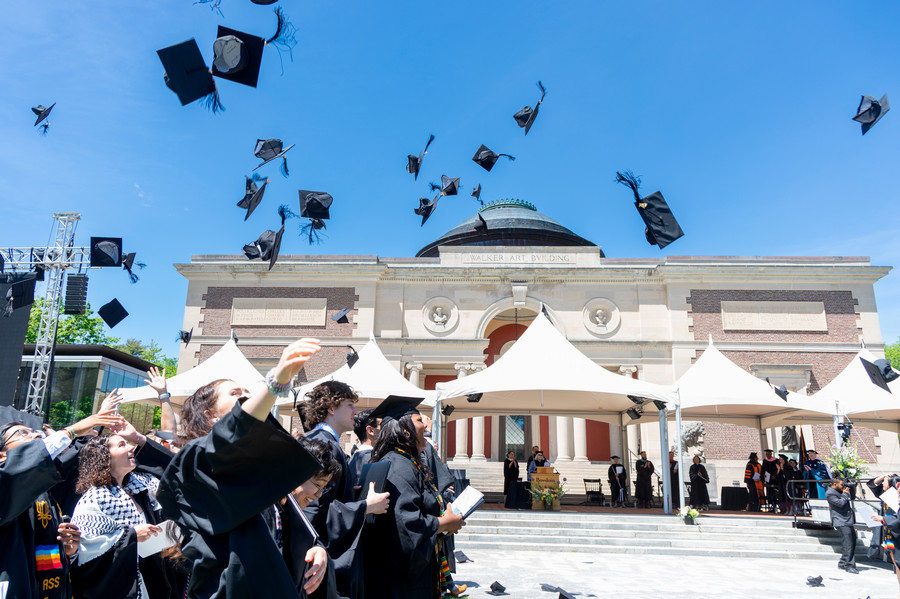Barry Mills on Defining Student Success
In his weekly column, President Barry Mills explains his views on how to define student success at Bowdoin.

I spoke last week to members of the Association of Bowdoin Friends, a group of neighbors and friends of the College who are committed to Bowdoin and who play a vital role here. The Bowdoin Friends seem to be everywhere—at athletics events, concerts, dance performances, and lectures. It is common for these folks to audit classes and to make significant contributions in our classrooms. Many serve as host families to students attending Bowdoin from foreign countries or from faraway places in U.S. They play an important part in our community, and we are very fortunate to have their interest and involvement.
My talk with the Friends is an annual event, and it is one that I truly enjoy. We gather in the evening in Main Lounge for coffee, dessert, and good conversation. I typically begin with some brief opening remarks and then open it up to questions on any topic. There’s no time limit. We just go on until it’s time to stop. This year, the son of one of our Bowdoin Friends, Paul Doolan, was visiting from Houston and asked an important question: How do we define success for a student at Bowdoin?
On the surface, this is a pretty straightforward question, but the answer has many layers.
Assessment is a hot topic in higher education these days, and Bowdoin is seriously involved in measuring all kinds of outcomes for our students. Of course, we look at the traditional measures of success like grade point averages and graduation rates. Strong grades reflect a measure of commitment to the academic program and a level of seriousness of mind. We celebrate students with the highest grade point averages at the annual Sarah and James Bowdoin Day exercise, and we take pride in our six-year graduation rate of 94%—a rate that is among the highest at any college or university in America. We are particularly proud of the fact that this impressive graduation rate holds true for students from a variety of socioeconomic backgrounds.
By the most important objective measures utilized today in higher education, Bowdoin students are highly successful. But anyone familiar with Bowdoin knows we expect considerably more from our students than strong grades and high rates of graduation. That’s why my answer at the Bowdoin Friends event focused on both academic performance and active engagement in the life of the College as the most important measures of success for Bowdoin students.
Don’t get me wrong. I am not a relativist, nor is Bowdoin the college equivalent of Lake Wobegon. Grades matter, and objective measures of success are important to us and to those trying to make judgments about the quality of our students, whether they are graduate or professional schools, or employers. In fact, my view is that the most significant measure of success lies in student engagement in their academic work—engagement reflected in the independent studies and honors projects that our students perform in large numbers each year. It is this serious committed engagement with sophisticated academic, intellectual, and artistic projects that defines our most successful students. These are the students who are gaining the life lessons of rigorous and deep analysis—second- and third-level thinking—that will benefit them in life and in their work beyond Bowdoin.
But at Bowdoin, we also expect our most successful students to become involved in the life of the College. These are the students who are also engaged passionately in all that Bowdoin has to offer—in the studio, on the stage and playing field, with the newspaper, and on and on. This additional involvement is important because it creates a level of personal satisfaction and allows for life lessons that are essential to becoming a complete individual in our complex society. The great news is that nearly all of our students are successful in these endeavors. You can follow their success on the Bowdoin Website and through the Bowdoin Daily Sun.
At the start of every academic year, members of the first-year class line up outside my office to sign the matriculation book and to see the signatures of the many impressive alumni who came before them. I shake hands with each and every student, and I remind them that Bowdoin is both a hard place to get into and a demanding place for success.
We recognize that students come to Bowdoin with different life experiences and different levels of academic and personal maturity. Our job is to establish standards and to enable our students to achieve to the very best of their ability; to recognize that success will ultimately be defined by how our students have used their time here to mature and learn.
Hyde wrote in “The Offer of the College” that college can be “the best four years of your life.” These are wonderful years, but they also represent a critical time because they set a course for life. My ambition for Bowdoin is that this historic College will continue to graduate students who have achieved at the highest academic levels, who have immersed themselves in all that Bowdoin has to offer, and who carry into life the values and seriousness of purpose nurtured here. That’s my definition of student success at Bowdoin.



